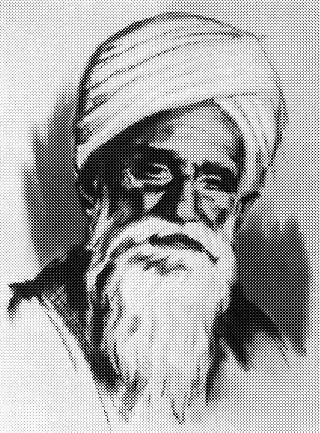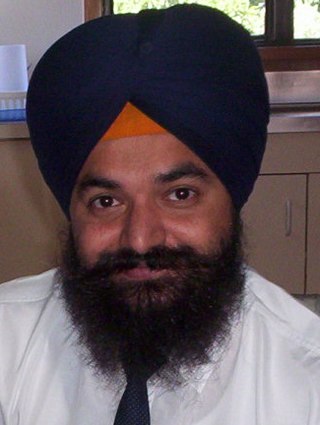
Beant Singh was an Indian politician and the 12th Chief Minister of Punjab from 1992 until his assassination by suicide bombing. He was a member of Indian National Congress.
Guru Nanak founded the Sikh religion in the Punjab region of the northern part of the Indian subcontinent in the 15th century and opposed many traditional practices like fasting, Upanayana, idolatry, caste system, ascetism, azan, economic materialism, and gender discrimination.

Batukeshwar Dutt was an Indian socialist and independence fighter in the early 1900s. He is best known for having exploded two bombs, along with Bhagat Singh, in the Central Legislative Assembly in New Delhi on 8 April 1929. After they were arrested, tried and imprisoned for life, he and Singh initiated a historic hunger strike protesting against the abusive treatment of Indian political prisoners, and eventually secured some rights for them. He was also a member of the Hindustan Socialist Republican Association.

The Chief Khalsa Diwan or Chief Khalsa Diwan Charitable Society is a Sikh organisation that is the central organization of various Singh Sabhas spread across Punjab, India. Unlike the Shiromani Gurudwara Prabandhak Committee, the C.K.D. is an apolitical body and only concerns itself with religious, educational and cultural issues. The organization originally controlled Sikh religious and educational concerns and was an advocate of Sikh political rights, though it presently is mostly limited to educational spheres. It was the main council of Sikhs until the birth of more radical organizations, such as the Central Sikh League, the S.G.P.C., and the Akali Dal.

Amrik Singh was the President of the All India Sikh Students Federation. He was killed in the Indian Army's operation on the Golden Temple on June 6, 1984.

The All India Sikh Students Federation (AISSF) is a Sikh student organisation and political organisation in India. AISSF was formed in 1943. as the youth wing of the Akali Dal, which is a Sikh political party in the Indian Punjab.

Baba Sohan Singh Bhakna was a Sikh revolutionary, the founding president of the Ghadar Party, and a leading member of the party involved in the Ghadar Conspiracy of 1915. Tried at the Lahore Conspiracy trial, Sohan Singh served sixteen years of a life sentence for his part in the conspiracy before he was released in 1930. He later worked closely with the Indian labour movement, devoting considerable time to the Kisan Sabha.

Verpal Singh heads The Sikh Centre, a not-for-profit organisation engaged in promoting greater interaction between Sikhs and the wider New Zealand community. He also runs a small publishing company specialising in niche areas.

Bhai Nirmal Singh Khalsa was a Sikh Hazoori Ragi of Darbar Sahib in Amritsar, Punjab, India.

Sardar Kapur Singh (1909–1986) was an Indian civil servant in Punjab and later a politician belonging to Shiromani Akali Dal. He was a Sikh intellectual, and wrote about Sikh religion and politics. He was also the author of the Anandpur Sahib Resolution of the Akali Dal in 1973, demanding rights of Punjab and the Sikh community. Singh was proficient in multiple languages including English, Punjabi, Persian, Arabic and Sanskrit.
The 2013 World Kabaddi Cup was the fourth edition of the circle style World Kabaddi Cup, held from 1 to 14 December 2013 with the Opening Ceremony on 30 November 2013 at Bathinda. The tournament took place in Punjab, India.
Gurbaksh Singh Khalsa was an Indian Sikh civil rights activist, demanding the release of Sikh prisoners from various jails in India.

Parkash Singh Badal was an Indian politician and Sikh rights advocate who served as the 8th Chief Minister of Punjab from 1970 to 1971, from 1977 to 1980, from 1997 to 2002, and from 2007 to 2017, the longest serving Chief Minister of Punjab till date. He was also Leader of the Opposition in the Punjab Legislative Assembly from 1972 to 1977, 1980 to 1983 and from 2002 to 2007 and the 11th Union Minister of Agriculture and Farmers' Welfare in the Morarji Desai ministry from 1977 to 1977. He was the patron of Shiromani Akali Dal (SAD), a Sikh-centered regional political party, and the president of the party from 1995 to 2008, when he was replaced by his son Sukhbir Singh Badal. As the patron of SAD he exercised a strong influence on the Shiromani Gurdwara Parbandhak Committee and Delhi Sikh Gurdwara Management Committee.

Gujranwala Guru Nanak Khalsa College (GGNKCL) is a private college located in the Ludhiana, Punjab, with affiliation from Panjab University. Originally founded in 1917, it offers undergraduate and post-graduate degree courses in various fields.

Gurdev Singh Kaunke was a Sikh priest who served as the acting Jathedar of the Akal Takht from 1986 to 1993.

Raja Surat Singh (1810–1881) was a Punjabi Jagirdar, a military officer in the Khalsa Army, and a member of the renowned Majithia family.

Harminder Singh Nihang, also known as Harminder Singh Mintoo, was a prominent Sikh militant and the 7th leader of Khalistan Liberation Force. Nihang was instrumental in reinvigorating the Khalistan Movement in the 21st Century. Nihang died in police custody.

Burj Gianian was a structure next to the Akal Takht built by Giani Soorat Singh, a priest in the Sikh Raj who was the head of the Giani Samparda. It was built in 1778 and served as the headquarters of the Giani Samparda until the end of the Giani Samparda in 1921. In 1988, it was demolished by the Punjab Government. It remained the main site for Sikh spiritual belief and power till the Shiromani Gurdwara Parbandhak Committee and Damdami Taksal's arrival.















